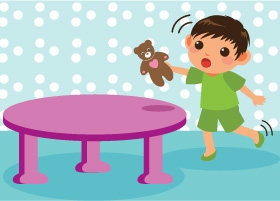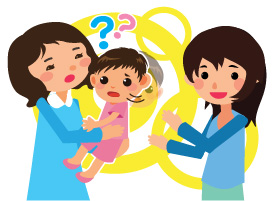Q: My child is 14 months old and he can walk 2 to 3 steps forward. However, he cannot let go of my hand. He will burst into tears whenever I release my hand. How can I make him walk on his own?
Learning walking is a brand new experience to young toddlers. As the coordination of all their limbs is still not mature enough to achieve good balance, all toddlers will go through a transitional stage of holding onto the adults' hand for support and sense of security. While temperament and developmental abilities vary in every child, the length of the transitional stage differs too. Your child needs to hold your hand to walk at the beginning. When you feel that he is more relaxed in walking, you may then gradually release your palm a bit or move a bit farther away from him. Eventually your child can walk on his own with the security provided by you. Remember to encourage your child and appreciate his effort to try.
You can facilitate his balancing skills by putting him on the floor and asking him to go to fetch things on a low table. Let him push a toy cart while walking can help too. He will also gain better sense of walking when he walks on bare feet at home.

Q: My son is now 1½ years old. He is so clingy that whenever I enter the kitchen or toilet and close the door, he cries and yells for me non-stopped. However, he is completely different when we are going out and does not seem to care about me even when I call him at his back. Is there any training I can do on him?
It is common for children to develop separation anxiety at around 8 to 18 months old. They will cling to their caregivers wherever they go, and will cry out of fear when the caregivers walk away. The behaviour actually reflects the intimate parent-child relationship. This phenomenon will gradually disappear when children reach 18 months of age.
According to your description, your son's separation anxiety seems to be at the disappearing stage. He will be distracted and becomes more relaxed when going out. This is a positive sign.
You may try to train him at home to reduce his separation anxiety. Play with him at home. Move a little away from him when he has settled down at play. At the same time, keep talking to him to let him know you are there. You can then move a little farther away if he can accept. This gradual approach can reassure the sense of security in your child and help him learn to play independently.
Remember to place your child in a safe place or hand him to another caregiver when you have to leave him. You also need to say goodbye to your child. Set simple rules with your child in daily life, e.g. let you hold his hand when going out. This helps him learn how to follow rules and instructions. All caregivers must be consistent and firm in carrying out the rules so that your child is easier to follow.
Q: My sister often pays us visits. However, she is upset every time because my 15-month-old daughter refuses to play with her. We feel embarrassed and would like to know how to change my girl's behaviour.
Every child is unique in temperament and preferences. They may prefer some people to others, and may reject some people for some reasons. You can observe closely the interactions between your daughter and her aunt. For instance, would your daughter be scared of auntie's high-pitched voice? Does auntie wear strong perfume? Would auntie insist on playing with your daughter despite your daughter feeling tired?
You can explain or hint to your sister if you could find out the reasons behind. Some tactics are needed in delivering the message if you are not close in relationship with the visitor. Besides, if the reason for your little girl to reject the visitor is difficult to resolve, you can show your girl by acting friendly with the visitor to alleviate the wariness of her to the visitor.
As it takes time for children to accept new things, make sure that you give your child adequate sense of security during the adjustment period. This can be done by giving her more hugs and guiding her to get close to other people gradually.

Q: What can I do if my child has constipation?
Constipation means the frequency of bowel openings is less than usual with dry and hard stool, the common reasons are:
- Imbalanced diet
- That means not enough fiber or too much protein intake, for example, eating too much meat or drinking too much milk will increase the chance of constipation.
- Not drinking enough water is another common cause
- Lack of physical activities
- Lack of regular bowel habit
When the child has the sensation of bowel opening, if he holds back, the sensation will disappear quickly. If the chance of bowel opening is missed, the stool will stay in the bowel longer. The water in the stool will be absorbed more and the stool will become drier and harder. When the dry and hard stool passes through the anus, it will tear apart the anal tissue which causes pain. To avoid the pain, the child will suppress the need to open the bowel further, causing a vicious cycle and making the problem of constipation more difficult to deal with.
In order to improve the consistency of your child's stool and stop the vicious cycle, you can try the followings:
- Help your child to develop a healthy, balanced diet
- Have half to one bowl of vegetables and half to one middle-sized fruit each day. Try to eat more foods with high fiber content such as potatoes, yams, oats, beans, sesame seeds, apples, bananas and strawberries.
- Do not eat too many foods that are rich in fat and protein. Two to four tablespoons of meat, fish or egg a day is enough. Your child do not need too much milk at this stage, 360ml of milk a day will provide him with sufficient calcium for growth.
- Let your child drink more water. It helps the bowel movements, makes the stool softer and easier to pass out. Encourage your child to drink water in between 2 meals, increase the amount of water intake during hot weather and after physical activities.
- Increase physical activities will improve the bowel movements and help in bowel openings.
- Let your child learn to have regular bowel habit is very important. You can observe your child's usual bowel habit and take him to the toilet regularly. Usually, it is easier to have bowel openings when waking up early in the morning or after mealtimes. Toilet training cannot be hurried. Starting too early or inappropriate training may make your child nervous and resist toilet training. If you want to know more, you can listen to “When can my child give up nappies?”.
If the condition does not improve, or there is anal tear, blood in stools or abdominal distension, you need to consult a doctor.
Please remember not to use laxatives or enemas without a doctor's prescription as this may result in undesirable consequences.

